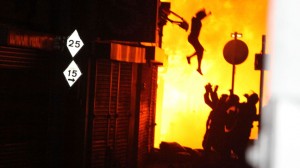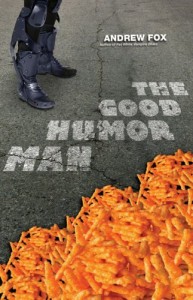
My concerned thoughts and supportive hopes go out to the residents, public safety personnel, and shopkeepers in the neighborhoods and cities in England which have been devastated by rioting and looting this week. I’ve experienced three close calls with riots and violent looting myself, twice in Miami (the 1980 Liberty City riot and the 1982 Overtown riot) and once in New Orleans (the looting and arson in Algiers and Terrytown following the landfall of Hurricane Katrina in 2005). So I feel a more than tenuous emotional bond with those people who are trying to pick up the pieces of their lives, businesses, and homes this week.
The reports I’m reading indicate that the majority of looters, arsonists, and rioters in England are young people. I’m the father of three young people (and stepfather to a fourth). On a daily basis I have opportunities to closely observe the behavior of my children, to try to rechannel some of that behavior in more positive directions, and to attempt to stamp out behaviors which can have no positive outcomes at all. Doing this over the past seven years has taught me a lot, particularly since my kids’ tendencies and behaviors match up very well with milestones I remember from my own moral development as a youngster.
I’ve come to hold certain beliefs about human nature, based on my experiences. Human beings are pleasure-seeking creatures. By “pleasure” I do not particularly mean “comfort” or “ease.” Much of the pleasure we seek is stimulation. Human beings are creatures who loathe boredom and who actively seek out novelty and new experiences, or look to repeat experiences which produce excitement, laughter, or a sense of triumph or mastery. This human tendency is neither good nor evil. It is essentially amoral. Depending on what the tendency leads to and how other emotions and faculties channel this restlessness, curiosity, and hunger for stimulation, it can result in either enriching discoveries (such as scientific and medical advances) or cruel catastrophes (wars of aggression or genocide).
I see it at work in my sons’ bathtub. My two youngest sons, Asher and Judah, take baths together. They love it. It’s playtime for them. Sometimes, for my four year-old, playtime heads in dangerous or inappropriate directions. Judah is fascinated by the notion of inserting bath toys or fingers into his older brother’s orifices. Both boys think this is hilarious. Mild warnings have not worked to dissuade this behavior. Shouting does not work. Punishments, including revocation of TV privileges or spankings, do work, but only for a few days. Then the behavior returns and must be stamped out (temporarily) with another punishment.
My youngest child is not evil or malicious. He is sweet and affectionate. He has no desire to hurt his older brother, although if he carries through on some of his designs, he could force a visit to an emergency room. The impetus leading to the behavior must be very strong, though, because Judah is willing to risk losing precious TV watching time or being slapped on the behind. He wants to laugh. He wants his brother to laugh. He wants, maybe most of all, to find out what will happen if he pushes a rubber alphabet letter up his brother’s anus or forces it into his ear canal. My only recourse as a parent is to remain vigilant, be consistent with my discipline, and hold the line until Judah reaches an age where he internalizes my moral instruction (“Putting a toy in your brother’s hiney-hole is BAD”) and can use cause-and-effect reasoning to put limits on his carrying out of his desires (“If I do what I want, I might hurt my brother, and I will be punished, which I don’t want”).
Children’s brains and emotional development typically reach a point, generally around the age of five or six, when external reinforcement (parental warnings or punishments) becomes slightly less necessary to control dangerous or maladaptive behaviors, because the child has begun carrying around a little parental voice of caution and condemnation inside his head. I remember very clearly when I made this transition. I was in first grade, about my son Asher’s age. My teacher had given me a little plastic toy sailboat, about two inches long, as a prize for doing well with my math tables. All day long at school, one of my friends, Dickie from up the street, asked to see the sailboat and to hold it. He made me promise to show it to him again after school, when we returned home. I became irritated with him and his repeated demands. I made a plan to show him just how irritated I was. I walked up the block from my house to his, my fists held behind my back. In one hand, I had the sailboat. In the other hand, I had a fistful of sand. Dickie was playing in his front yard. When he saw me, he immediately asked if I had brought the sailboat. I said yes, showed him the sailboat in one hand, and then threw the handful of dirt into his face. His grandmother saw this through the window and ran outside to comfort Dickie and yell at me. I ran home. I felt terrible. I knew I had done something very wrong (although I had not perceived my action to be wrong during its planning phase). I felt that God had seen what I had done. I was very afraid. I ran into my bathroom, locked the door, knelt down on the floor, and prayed for God’s forgiveness (the forgiveness of the Omnipresent Parent) and that Dickie would be all right.
Later, after the establishment of the Internal Parent, comes empathy, if all goes right with a child’s development. Empathy is perhaps an even stronger deterrent against carrying through on desires which may prove harmful to others. I also remember the age and time when I discovered I had developed empathy, and that empathy could make me suffer deep shame at my behavior. I was eight years old and attending summer day camp. One of the other campers had a mild facial deformity, a cleft palate which had been partially corrected by surgery. He was also shy and socially awkward. One afternoon, my camp group piled onto a bus to go on a field trip. A number of the other children began taunting the boy with the cleft palate. I briefly joined in what seemed to be the fun of the moment. But then I stopped myself. I remembered that other children, in a different setting, had made fun of me for being socially awkward and for excelling in my classwork (for being a nerd, essentially). I realized, in a moment of searing shame, that I had briefly let myself become just like my own tormentors, whom I hated. I swore to myself that I would never do anything like that again. And I never did.
Cruelty, once separated from its moral dimension, is fun. Any honest person will admit to this. Cruelty is a form of experimentation. It allows us to pursue the answer to our question, “If I do this, what will happen then?” How cutting an insult do I need to address to my sister before she cries? How hard do I need to pull a cat’s tail to make it yowl? Will it do anything in addition to yowling? Experimentation is a way of satisfying curiosity, and curiosity is one indicator of our powerful human drive for stimulation. Empathy can serve as a limit setter on experimentation. What are medical and scientific ethics if not applications of empathy, used as guideposts outside of which our explorations and experimentations must not venture? Science, on its own, without the application of empathy, is amoral. The medical experiments of the Nazi doctors in concentration camps took place in an environment where empathy had been abandoned, where medical and scientific guidelines had been willfully cast aside. I’m certain those doctors enjoyed their work. I’m certain they found it fascinating, even fun. They were operating at the limits of human knowledge. They were discovering answers to questions that most other doctors and scientists had not allowed themselves to even ask, much less pursue. They were exercising, without limit, their Will to Power — which, at its most basic, is an unhindered seeking of stimulation, whether that stimulation be sexual, exploratory and intellectual, or the satisfaction of physical appetites.
I find it very instructive that two of my boys’ favorite TV shows are Destroy, Build, Destroy, and Dude, What Would Happen? Both shows on Cartoon Network feature groups of nominal adults, men in their twenties, acting out the destructive fantasies of pre-adolescent boys. What would happen if you built a catapult and catapulted a washing machine onto the roof of a barn? What would happen if you dropped six dozen raw eggs off a fifteen-foot-high platform onto a man’s head? What would happen if you filled a school bus with explosives and set them off? These shows illustrate the results and scratch that itch to know. More often that not (unless the experiment turns out to be a big dud, which sometimes happens), my boys cheer and laugh and slap each other on their backs, almost as excited as if they’d carried out that bit of spectacular vandalism themselves.
Without our essential drive for stimulation and novelty, mankind would likely have remained an African population of a few hundred thousand hunters and gatherers. But untempered by empathy, our strongest and most ambitious individuals would have wiped out everyone else, and our most powerful intellects would have acted as the equivalents of the Nazi doctors. Which has oftentimes, in the absence or weakness of countervailing civilization, been the case.
I believe that empathy is a natural facility of human beings, but that some people are granted a stronger tendency or “talent” for it than others. I also believe that, within certain limits, empathy can be taught, and that with practice one can get better at utilizing it. My middle son, Asher, is a very sweet six year-old who loves animals, but he sometimes, to use a colloquialism popular in our household, “gets the devil in him.” His need for stimulation, for excitement and enjoyment, outweighs his common sense and his still-developing sense of empathy. He pulls a cat’s tail, stomps his feet near one of the cats, or throws a toy at one of them, to see what they will do. When I catch him doing this, I threaten to punish him, and I ask him this question: “How would you feel if you had a tail and the cat pulled it?” He answers, “I don’t have a tail.” I say, “Well, imagine you do. How would that feel? Would you like it if the cat pulled your tail?” “No…” he replies. And I watch the gears turn behind his eyes. And each time we repeat this little script, repeating it becomes a little less necessary.
The extent of empathy in individuals ranges a great deal. We can learn much about empathy and its limits from neuroscience, from observation of those individuals who, due to neurological abnormalities, are outliers in their capacity to experience and utilize empathy. Sufferers of Asberger’s Syndrome are unable to instinctively deduce the thinking and motivations of other people. This greatly limits their natural development of a sense of empathy. Yet they can be coached to develop a kind of intellectual empathy which they can use to substitute for their missing innate, emotional empathy. Sociopaths, on the other hand, both lack a natural sense of empathy and cannot be coached to develop one. The best that their family and society can do for them is to help them strengthen their cause-and-effect reasoning, to make them aware of external deterrents and limiters on their behavior, so that, even though they lack internal monitors and counterbalances, they recognize that they will suffer a consequence whose undesirability outweighs the desirability of whatever antisocial or dangerous stimulus-seeking they might be contemplating.
All societies have populations which span the full range of empathic ability, from saints to sociopaths. The majority of individuals have been trained by their parents, families, peers, churches, and schools to properly utilize their natural sense of empathy to curb their appetite for stimulation. However, some individuals have lesser talents for empathy and have either not responded to training or have not received it. Other individuals have no talent for empathy at all, and they are only kept in check by external reinforcers, such as legal penalties or the threat of retaliatory violence.
I believe what happened in London and other parts of England earlier this week, and what happened in Miami in 1980 and 1982 and in New Orleans in 2005, was the result of the bulwark of external societal reinforcement being temporarily removed or greatly weakened by a natural disaster or an initial outbreak of social unrest, which either siphoned off resources or unveiled as hollow the retaliatory power of the authorities. I also believe that the unhindered stimulation seeking — what does it feel like to take whatever I want? what does it feel like to set a building ablaze? what does it feel like to beat a stranger senseless? — was intensified in each of those places by large numbers of individuals whose parents and communities had not properly applied themselves to the basic tasks of setting limits, teaching empathy and its corollary, morality, and, at a minimum, ensuring that appropriate consequences are in place for stepping over the lines.
This, essentially, is the story told by a few of the young rioters and looters in England who were interviewed by Radio 4’s Today program on Tuesday morning. In their own words, their decision to go into Manchester and loot was rational and calculated, based upon the unlikelihood of their being severely punished, either by the law or by their parents, and upon the ease and convenience of pursuing their appetites in the midst of the general anarchy. I read or listened to very similar interviews with rioters and looters in Miami and New Orleans. This is not a phenomenon limited to England.
Like this:
Like Loading...







